Is China's pandemic diplomacy working?
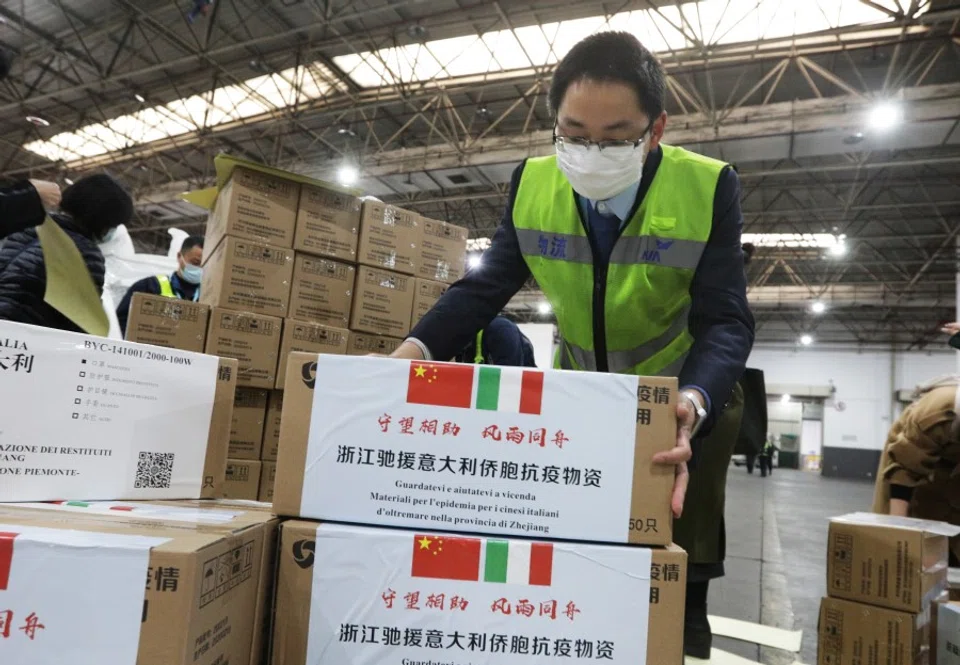
The Chinese national anthem ringing out in Italy's residential areas, Serbian president Aleksandar Vučić kissing the Chinese flag, tennis star Novak Djokovic writing "Xie Xie. Wõ ài ñi zhōngguó" (谢谢,我爱你中国, Thank you, I love you China)... Over the past week, Chinese mainstream media and social media have been awash with reports of various countries thanking China for its assistance in efforts against the Covid-19 pandemic, sparking praise from the internet community of China's effective "pandemic diplomacy".
While the pandemic sweeps the globe, China as the first big country to move out of this public health crisis has been exporting supplies, manpower, and experience against the pandemic to raise its international image and push its diplomatic agenda. This diplomatic offensive executed in extraordinary times has led to different reactions in various countries.
Three objectives of China's pandemic diplomacy
According to China's foreign ministry, the Chinese government has provided pandemic supplies such as test kits, masks, and protective suits to over 80 countries, as well as the World Health Organisation (WHO) and African Union (AU), and sent medical expert teams to Iran, Iraq, and Italy. Over the past two months, Chinese President Xi Jinping has spoken with the heads of about 30 countries and international organisations; on 26 March, he also joined a special G20 summit on the pandemic. (NB: China's efforts at being perceived as a reliable source of help in times of distress has not all been smooth. While a commercial aircraft carrying 80 tons of medical supplies such as masks, gloves, thermometers, and gowns landed in New York from Shanghai on 29 March, Spain has reportedly had to return some test kits it had ordered from a Chinese company as the devices did not produce accurate results. And over the weekend, the Netherlands reported that they had recalled masks from China that were already dispatched to hospitals as they did not meet quality standards.)
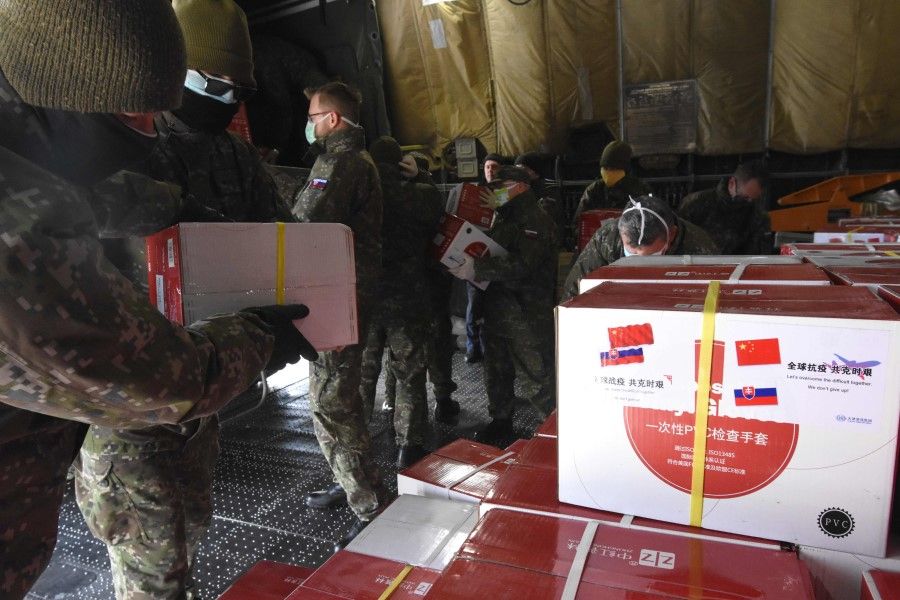
Academics think there are three motives behind China's pandemic diplomacy. First, repaying the countries that helped it when the coronavirus broke in China; second, making up for the negative impression made by its failings in handling the initial stages of the outbreak; and third, increasing China's international influence and building an image of being a "responsible great power". However, these three overlapping motives have resulted in different reactions to China's assistance.
When the coronavirus broke out in China, 79 countries and 10 international organisations provided supplies in support. In return, China is also providing medical supplies to these countries, as well as donating US$20 million (S$28.9 million) to the WHO to support international cooperation against the pandemic. In the words of China's foreign ministry spokesperson Geng Shuang, this shows the traditional Chinese virtue of repaying favours (投我以木桃,报之以琼瑶).
Even though China subsequently appeared "quite competent" in handling the outbreak, it did not make up for the earlier negative impression. - Prof Kong Yoosik, Pyeongtaek University
For instance, in late January, South Korea donated 2 million masks and 100,000 protective suits to China. This month, China announced that it will give South Korea 1.1 million masks, 10,000 protective suits, and 50,000 test kits, while over 20 local governments in China are also donating medical supplies to the South Korean cities they are friendly with.
However, Professor Kong Yoosik, an East Asian studies expert at Pyeongtaek University, said in an interview with Lianhe Zaobao that such news is not widely reported in South Korea, and hence has minimal effect on helping to make up for the impact on China's image due to its prior mishandling of the outbreak.
Prof Kong noted that as one of the first countries outside of China to be affected by the outbreak, many people in South Korea feel that the country was a victim of China's cover-up of the outbreak, and "fully attribute the root of the disaster to China's early mistakes". Even though China subsequently appeared "quite competent" in handling the outbreak, it did not make up for the earlier negative impression.
Associate Professor Cheng Xiaohe of the School of International Studies at the Renmin University of China told Zaobao that after China's initial mishandling, it implemented the lockdown on Wuhan to stop the spread of the virus, and has been extending a helping hand to other countries to try and erase the resentment towards it as the country of origin of the virus, and to reverse its passive role in the narrative of the virus.
Good deeds should be done quietly
However, China's high-profile publicity of its pandemic diplomacy has sparked backlash in some countries. Last week, China's foreign ministry spokespersons Hua Chunying and Zhao Lijian posted video clips on Twitter of Italian people playing China's national anthem and thanking China, only for local media Linkiesta to question it as fake news. Italian investigative journalist Guilia Pompili also revealed that most of the supplies provided by China were in fact paid for and purchased by Italy, and not "donated" as Italian officials claimed.
... good intentions have been undone by the high-profile show put on by propaganda departments. - Prof Zheng Yongnian, National University of Singapore
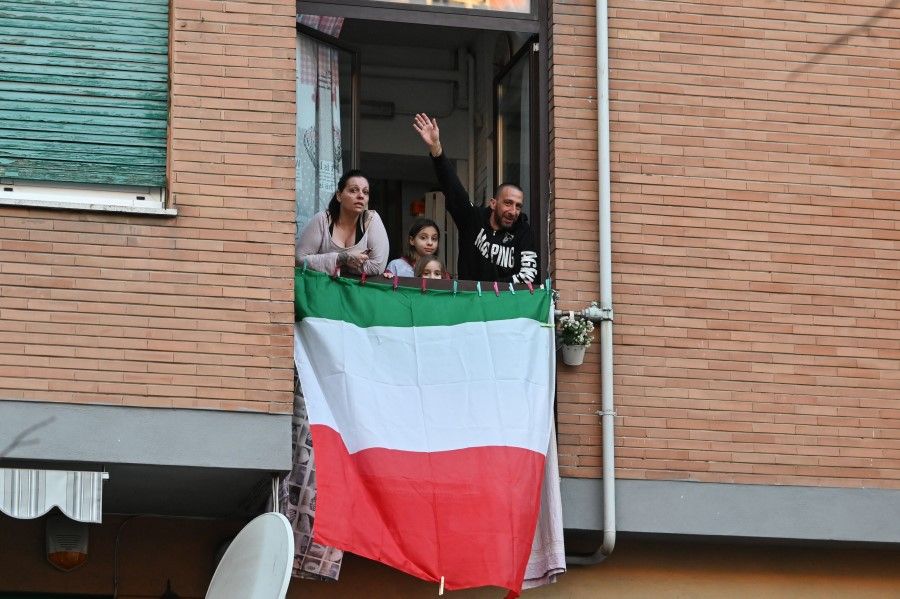
According to Professor Zheng Yongnian of the East Asian Institute at the National University of Singapore, it would have been a good thing for China to help other countries at this time, and it would have won the respect of the international community if it was done quietly. "But these good intentions have been undone by the high-profile show put on by propaganda departments. Besides, China does not have real soft power, so it is difficult to change other countries' impression of it," he said.
During an online conference this week with the Centre for China and Globalisation (CCG), CCG's nonresident senior fellow Ding Yifan expressed the view that the people of China should consider pandemic diplomacy more calmly. He said, "The Chinese think they should be praised by the international community for doing such a good job, but this actually sparks fear in Western countries such as the US, France, and Germany. They will be wary of China's rising influence and will not praise it... the gap between the Chinese and Western mainstream media will grow."
"No matter what China's intention is, just going by the results, what it is doing is good for controlling the global spread of the virus, and should be encouraged." - Prof Wang Jiangyu, City University of Hong Kong
Professor Wang Jiangyu, director of the Centre for Chinese and Comparative Law at the City University of Hong Kong (CUHK) thinks the international community should be more objective about what China is doing. He said that China has always been building an image of being a rising "responsible great power", and its current pandemic diplomacy is in line with its standard practice, but not as blatant as its previous approach of chequebook diplomacy.
Prof Wang added, "No matter what China's intention is, just going by the results, what it is doing is good for controlling the global spread of the virus, and should be encouraged."
China shares experience in a bid to shape the narrative
Apart from providing masks, protective suits and ventilators, China also shared its first-hand experience of fighting the pandemic over the past two months.
Geng Shuang said on 25 March that China has held about 20 video conferences for experts with more than 100 countries as well as international organisations including ASEAN, the EU, the AU, the Shanghai Cooperation Organisation (SCO) and the Caribbean Community, sharing its experience in prevention and treatment processes. They have also translated their treatment protocols and containment measures into many foreign languages and shared them with the international community.
"Traditional Western powerhouses like the UK, France, Germany and the US will not easily adopt China's approach perhaps out of pride or confidence in their own healthcare systems." - Prof Wang Jiangyu, City University of Hong Kong
Various countries have also learnt from China and started to build makeshift hospitals at China's suggestions. For example, Italy, Iran, and Serbia have begun building makeshift hospitals that can admit over a thousand patients, specifically used to quarantine and treat mildly-infected patients.

Prof Wang observed that countries willing to accept China's complete model of epidemic prevention were mostly developing countries that lacked a comprehensive healthcare system. Even Italy is considered a relatively weak country, compared to other European countries. "Traditional Western powerhouses like the UK, France, Germany and the US will not easily adopt China's approach perhaps out of pride or confidence in their own healthcare systems," he explained.
Asian countries like Japan and Korea that have fared relatively well in their epidemic control efforts each have their policy strengths. Korea effectively identified infected patients through large-scale testing while Japan lowered the possibility of community spread of the virus through declaring a national closure of schools and cancellation of large sporting and cultural events.
South Korea also has experience fighting MERS and thus does not need to copy from China.
Veteran commentator Okada Takashi from Japan's Kyodo News told us in an interview that most Japanese found it shocking that China had implemented lockdowns, shut transport networks, and built makeshift hospitals within such a short span of time. He said, "Although we are shocked, we have to admit that only China's centralised governance is able to implement a two-month lockdown isolation strategy to achieve results in the pandemic by forcefully restricting personal freedom."
Prof Kong is also of the view that containment measures in China worked well due to systemic reasons and the result is not something that can be easily replicated by other countries. Furthermore, South Korea also has experience fighting MERS and thus does not need to copy from China. "Taking the example of Daegu, we managed to control the outbreak without having to impose a lockdown," he said.
US seeks to wrest control of the global narrative
China's relentless "pandemic diplomacy" has also triggered backlash from the US, which has been absent from the global leadership arena of the pandemic thus far. Under the double pressure of an internal outbreak and the crashing of its financial market, American officials have repeatedly pointed fingers at China, claiming that China should be held accountable for the pandemic. China and the US have been fighting to shape the global narrative of the outbreak for a period of time, and the battlefield of their "war of words" have shifted from social media platforms to state press conferences.
Prof Wang pointed out that the US is currently busy saving itself and is unable to provide assistance to the rest of the world. On top of that, President Donald Trump is not interested in becoming the global leader on this issue anyway. However, China's apparent success in containing the pandemic in China and its efforts to enhance its international influence through pandemic diplomacy have nevertheless triggered a counterattack by the US government.
He pointed out that the outbreak in the US is still in its developing phase and based on the capabilities of this superpower, the outbreak will be contained in no time. When that happens, the US will also be able to share their experiences with the world.
This time, however, the US did not receive support from its allies like it did before. Australian Prime Minister Scott Morrison has even expressed that he thinks the US should be held accountable for Australia's outbreak. He said in an interview with local TV stations that the majority of confirmed cases in Australia originated from the US and that there was no sign that China had deliberately spread the virus.
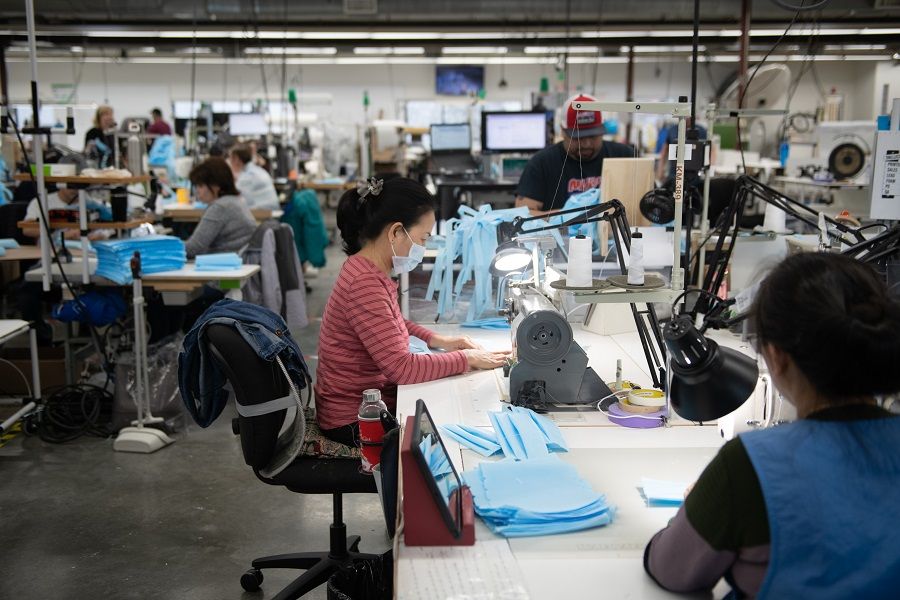
Prof Cheng noted that America's outbreak came two months after Wuhan was locked down. It originally had ample time to guard against the virus but due to the government's negligence, the outbreak spread within the country. Pushing the blame to China under such circumstances would not win international support.
However, he also urged caution regarding bold statements such as "China will become the US's saviour" and that "all countries should copy from China" made by Chinese netizens. He pointed out that the outbreak in the US is still in its developing phase and based on the capabilities of this superpower, the outbreak will be contained in no time. When that happens, the US will also be able to share their experiences with the world. In contrast, China is currently experiencing an increased risk of imported cases triggering a second wave of the pandemic. If so, how it responds will be yet another test of China's epidemic prevention and control abilities.
Prof Cheng said, "The fight between the Chinese model and the American model has now extended to the public health arena. The next crucial step to determine which of the two countries will take the lead in the pandemic lies in who's faster in developing a vaccine or specific medicine for Covid-19. This is the key resource that the world desperately needs."
The global diplomacy landscape after the pandemic
Regardless of different countries' evaluations of China's "pandemic diplomacy", one thing remains indisputable - the reason that China has been able to play such an active role on this front comes down to the absence of other major powers and regional organisations. The globalisation and regionalisation systems that various countries have relied on for a long time are terribly vulnerable in the face of this pandemic.
China's moves might even invite backlash from traditional Western countries, placing China-EU and China-US relations under immense pressure.
Even the EU, often viewed as speaking with one voice, has shown internal disharmony since the onslaught of the pandemic. Germany and France have apparently intercepted the medical resources meant for other EU countries. Such behaviour has angered the other EU countries and caused some to wonder if the international order was regressing to the era of the "survival of the fittest". Italian ambassador to the EU Maurizio Massari also lamented that not a single EU country responded to the European Commission's call to render assistance to Italy. In the end, only China came to its aid.
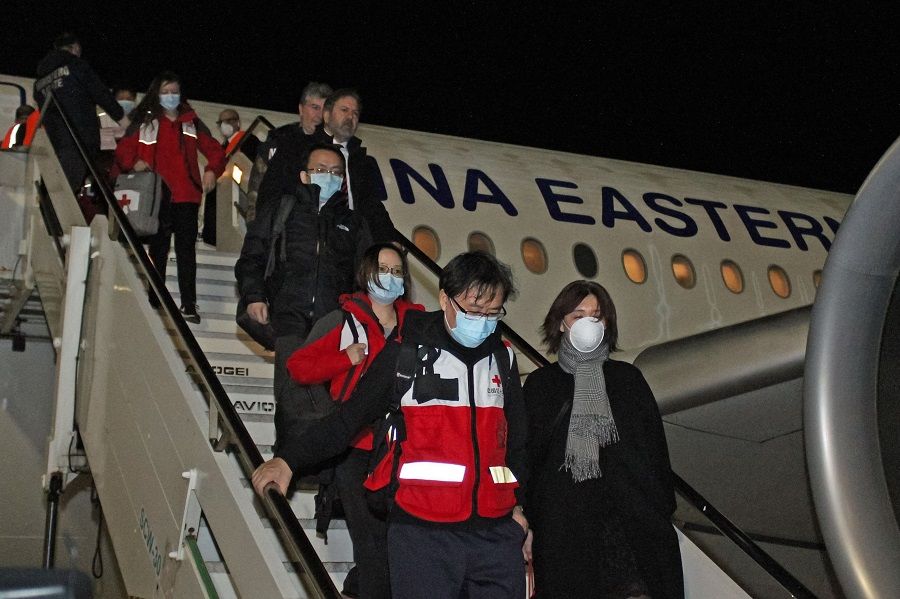
However, all the scholars this reporter interviewed generally agree that the global diplomacy landscape will not undergo a major shake-up because of this. While China can utilise this opportunity to demonstrate the benefits that this rising power can bring to the international community and expand multilateral collaboration that in turn increases its international influence, it will not replace the US which has been the longstanding international leader. Instead, China's moves might even invite backlash from traditional Western countries, placing China-EU and China-US relations under immense pressure.
While EU countries such as Italy would be grateful to China for rendering assistance after being left in the lurch by the EU, they would also be sandwiched between the EU and China.
According to Okada Takashi, China and the US's efforts during this pandemic stand in sharp contrast. China's assistance to European countries could bring about positive effects to push forward the Belt and Road Initiative in Europe and create a better diplomatic environment for China. "Unfortunately, Japan will not change its stance towards China," he said. "The Trump administration's new Cold War mentality is forcing Japan to choose between China or the US. Although this puts Japan in a dilemma as it intends to begin economic cooperation with China, if forced to make a choice, most Japanese would prefer to keep the status quo and adhere to the US's societal and economic systems."
Ding, on the other hand, thinks that China's show of big power capabilities and international spirit may improve its relations with developing countries, but not with the EU. This is because while EU countries such as Italy would be grateful to China for rendering assistance after being left in the lurch by the EU, they would also be sandwiched between the EU and China. "Key European countries such as Germany and France are worried that if China's influence becomes stronger, China-EU relations might worsen, leading to greater geopolitical competition," he added. (NB: French President Emmanuel Macron said in an interview with Italian media over the weekend that France stands with Italy, asking why there was much talk about medical supplies to Italy from China and Russia but not the ones from France and Germany. He urged Europe to remain united, saying that he did not want a "selfish and divided Europe".)
He (Prof Zheng Yongnian) pessimistically predicts that the panic caused by the outbreak could instead further catalyse Europe's racism and populism issues, as shown in the discrimination that the Chinese in Europe have faced following the outbreak of the pandemic.
The G7 Foreign Ministers' Meeting held last week clearly illustrates the international community's contradictory positions towards China. According to European diplomats, as the US's push for the inclusion of the phrase "Wuhan virus" in a joint statement was rejected by other countries, the joint statement fell through in the end.
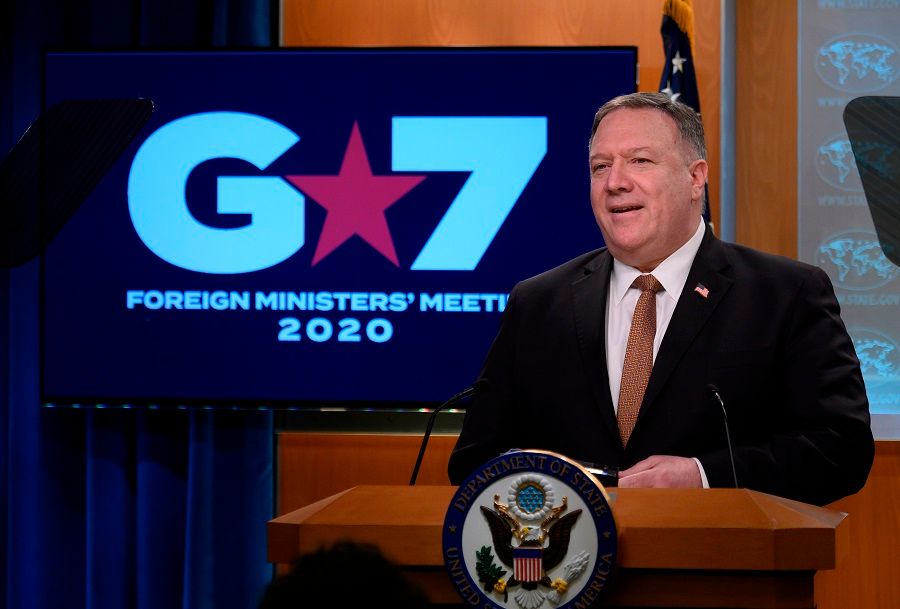
Prof Zheng thinks that it will be hard for Western democratic societies to remove their entrenched animosity against communist countries just through this pandemic. He pessimistically predicts that the panic caused by the outbreak could instead further catalyse Europe's racism and populism issues, as shown in the discrimination that the Chinese in Europe have faced following the outbreak of the pandemic. He said, "If the pandemic is controlled in a few month's time, it can't be ruled out that another wave of anti-Chinese sentiments in European countries could emerge. From that perspective, the pandemic is not an opportunity for China but a crisis instead."
Prof Wang is more optimistic about the situation. Based on an analysis of public statements from leaders of various European countries, most European countries are presently friendly towards China. Additionally, as they rely on China to provide them with large volumes of medical supplies, they are less likely to oppose China. "Mainstream public opinion in most countries condemn discriminatory behaviour against the Chinese. Even in the US, a lot of people are against Trump's use of the phrase "Chinese virus", as shown in the rebuttal given by The New York Times," he said.
As the pandemic runs its course, China's "pandemic diplomacy" continues apace. The long-term effects these efforts will have on the global balance of power are not only dependent on how well can China guard against a resurgence of the outbreak while maintaining its image as a responsible major power, but also on how long it would take for international and regional leaders like the US and the EU to make a comeback and restore countries' confidence in them.
Note:
In a report published by the Mail on Sunday over the weekend, close allies of UK Prime Minister Boris Johnson said that China's behaviour during the Covid-19 pandemic will eventually result in a "reckoning" in relations with Beijing. Among other things, the UK's top officials are reportedly furious with China over its disinformation campaign - including suggestions that a US army delegation to Wuhan could have been the source of the coronavirus - amid warnings from the UK's scientific advisers that China's officially declared number of cases could be "downplayed by a factor of 15 to 40 times". Such negative sentiments about China could add further weight to calls for the UK to unwind its decision to let Huawei have a role in building the UK's 5G infrastructure.
